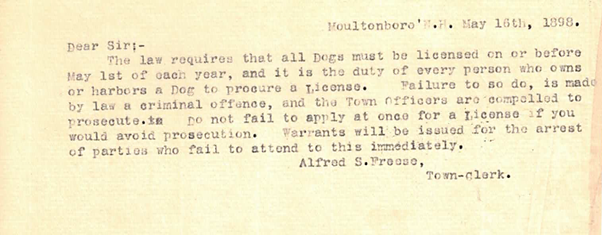The information contained in this article is not intended as legal advice and may no longer be accurate due to changes in the law. Consult NHMA's legal services or your municipal attorney.
We get this question a lot in the Town Clerk’s office, and the answer has evolved a bit over the last couple of centuries – so I decided to do some research. In browsing digital catalogues, the earliest mentions of dog licensing I found were in New Hampshire legislation records from around 1811 and 1842, where “no person shall be held liable for killing any dog […] found not having around his neck a collar […] with the name of the owner or owners engraved thereon,” and “Any town may make by-laws for licensing, regulating or restraining dogs.” (Laws of the State of New-Hampshire (1830), Title LI, and NH Revised Statutes of 1842, Title XIV, Chapter 127, Sections 5 & 6) The licensing of dogs wasn’t made a statewide requirement until around 1891, where the verbiage changed from “may” to “shall.”
Licensing initially was a way for municipalities to ensure victims of damaged property or livestock were properly compensated by the owner of the dog at fault. New Hampshire residents often relied on agriculture at that time, and farms raising sheep, swine and cattle were quite common. One can imagine how the loss of income or food might be especially devastating in this period of history, where resources would not have been quite as obtainable as they are today.
The fees at that time were also set by state law: $2.00 for every male dog, and $5.00 for every female dog. In today’s currency, those license fees would be $74.82 and $187.04, respectively! Fees began increasing around 1977 and are no longer based on the gender of the dog. Fees are now based on the age of the dog, whether the dog is altered, and the age of the owner. The license fees are divided up between the municipality and the state, with a portion set aside for animal population control and operation of the state’s veterinary diagnostic lab.
Around 1891, with the restructuring of dog licensing laws, “hydrophobia” (now more commonly known as rabies) became a more pressing reason for dog licensing. In the New Hampshire Public Statutes published in 1901, Section 4 of Chapter 60 states every dog license “shall have printed thereon a description of the symptoms of the disease in dogs known as hydrophobia” in an effort to inform dog owners of what to look for. Rabies was (and is) not just a threat to dogs and livestock, but also to humans. Rabies remains to this day a preventable – but often not treatable – disease, with a fatality rate of nearly 100% in both dogs and humans.
Dog licensing now serves as a way of ensuring local animal populations are vaccinated against rabies, and as a record of ownership so lost dogs can be returned to their homes. Town Clerks have often assisted in reuniting runaways with their owners and have also received calls from concerned citizens asking if a dog has been vaccinated so they know whether to seek further medical attention after being bitten by a dog. Licensing and vaccination are required by several RSAs in Chapter 466, and RSA 436:100. Failure to do so can result in dire consequences in the event of a dog coming into contact with another rabies-infected animal, outlined in RSA 436:106.
Dog licenses are required to be renewed annually by April 30th, but if paid June 1st or later, late fees and civil forfeiture fines will be charged per state law. Dog owners can avoid these extra charges by renewing their licenses early. While it may seem silly or outdated to some, dog licensing remains an important requirement of dog ownership in New Hampshire.
 A photocopy of a Civil Forfeiture notice from 1898, from the
A photocopy of a Civil Forfeiture notice from 1898, from therecords of the Town Clerk of Moultonborough.
New Hampshire Legislature. (1843). Chapter 127: Of the Destruction of Noxious Animals and the Preservation of Game. In The revised statutes of the State of New Hampshire passed December 23, 1842 : to which are prefixed the constitutions of the United States and of the State of New Hampshire (p. 241). Concord, N.H. - Carroll & Baker.
New Hampshire Legislature. (1900). Licensing of Dogs. In W. M. Chase, The Public Statutes of the State of New Hampshire, and General Laws In Force January 1, 1901 (p. 368). Concord, N.H.: Edson C. Eastman.
New Hampshire Legislature. (1930). Title LI. Dogs. In The Laws of the State of New Hampshire With the Constitutions of the United States and of the State Prefixed (p. 218). Isaac Long, Jr.
New Hampshire Legislature. (1977, August 30). Licensing of Dogs, Section 466:7 - Additional Charge Where Payment of LIcense Fee is Delayed. -. Retrieved from The General Court of New Hampshire: https://www.gencourt.state.nh.us/rsa/html/XLV/466/466-7.htm
New Hampshire Legislature. (1998, January 1). Licensing of Dogs, Section 466:1 - Procuring License; Tag. -. Retrieved from The General Court of New Hampshire: https://www.gencourt.state.nh.us/rsa/html/XLV/466/466-1.htm
New Hampshire Legislature. (2001, July 16). Licensing of Dogs, Section 466:13 - Forfeiture. -. Retrieved from The General Court of New Hampshire: https://www.gencourt.state.nh.us/rsa/html/XLV/466/466-13.htm
New Hampshire Legislature. (2017, August 1). Rabies Control, Section 436:106 - Handling of Dogs, Cats, and Ferrets Bitten by Rabid Animals. -. Retrieved from The General Court of New Hampshire: https://www.gencourt.state.nh.us/rsa/html/XL/436/436-106.htm
New Hampshire Legislature. (2023, July 1). Rabies Control, Section 436:100 - Rabies Vaccination Required; Exemption. -. Retrieved from The General Court of New Hampshire: https://www.gencourt.state.nh.us/rsa/html/XL/436/436-100.htm
New Hampshire Legislature. (n.d.). Chapter 466: Dogs and Cats. Retrieved from The General Court of New Hampshire: https://www.gencourt.state.nh.us/rsa/html/NHTOC/NHTOC-XLV-466.htm